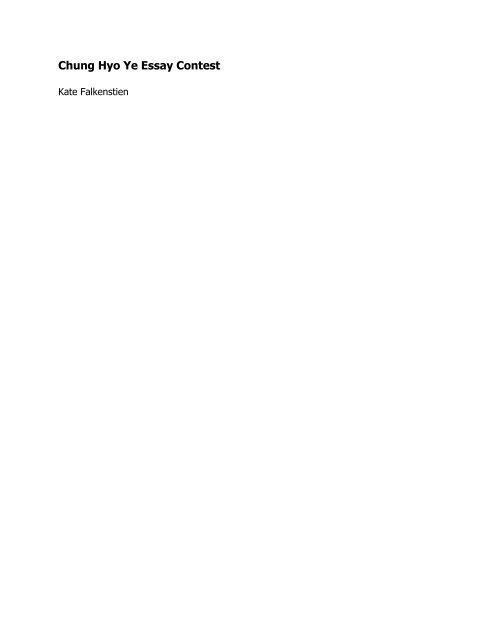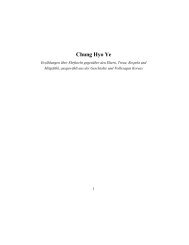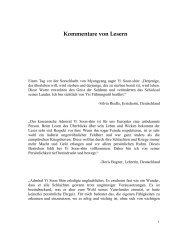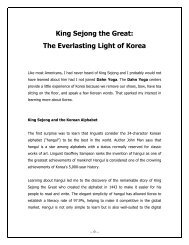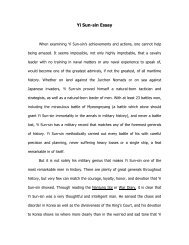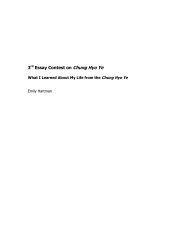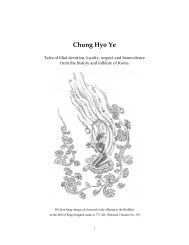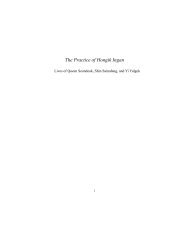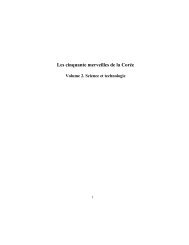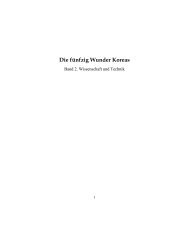Chung Hyo Ye Essay Contest
Chung Hyo Ye Essay Contest
Chung Hyo Ye Essay Contest
You also want an ePaper? Increase the reach of your titles
YUMPU automatically turns print PDFs into web optimized ePapers that Google loves.
<strong>Chung</strong> <strong>Hyo</strong> <strong>Ye</strong> <strong>Essay</strong> <strong>Contest</strong><br />
Kate Falkenstien
American culture simply does not value the elderly. We treat them as a burden<br />
to be dealt with, not a treasure trove of wisdom or an honored part of an extended<br />
family. On a political level, we offer scant resources to support senior citizens and<br />
propose to cut even those when the Social Security program seems threatened or<br />
Medicaid seems to be a drain on the taxpayers. On a personal level, our respect is just<br />
as meager. Many Americans pride themselves on their ability to act as individuals who<br />
not only break free of their families but actively defy the way they were raised.<br />
Rebellion is a norm, almost considered a necessary rite of passage. To make real<br />
sacrifices for parents is to be tied down too much, to succumb to unfair pressures, our<br />
societal dialogue seems to scream.<br />
Coming from such an individualistic culture, I was truly impressed by the tales of<br />
filial devotion in <strong>Chung</strong> <strong>Hyo</strong> <strong>Ye</strong>. Far beyond merely providing a home for their aging<br />
parents or showing respect to elders in disagreements, the characters in the book often<br />
make life-changing decisions in order to help their parents. No sacrifice is too much.<br />
For example, Sim Chong gives her entire life to help her father see. Her blind father<br />
needs three hundred sacks of rice to donate to a temple to gain perfect vision, yet the<br />
family is too poor to provide it. Placing the needs of her father ahead of her own<br />
dreams, Sim Chong trades herself for the rice to sailors looking for a girl to sacrifice to<br />
the ocean at a crucial point in an upcoming voyage. Even then, however, as she faces<br />
her death, she considers her father’s feelings. She pretends to be moving in with a rich<br />
woman lest her father attempt to stop her sacrifice out of love for her. Hiding her own<br />
fear, she feigns excitement at the opportunities she will have with her new adopted
mother. Although she ultimately tells him the truth, she only does so because she can’t<br />
bear to lie to someone she loves so much. All her actions are centered around care for<br />
her father, not concern for her own well-being. At this point in the story, I assumed<br />
that someone would step in to save Sim Chong. After all, her mere willingness to give<br />
her life proved her devotion; I thought the story would prove its point without her<br />
actual death. But as I read on, I found that Sim Chong kept true to her promise, falling<br />
into the ocean as a sacrifice. For a moment, I was shocked at the simple tragedy of it,<br />
but I soon realized that my shock was merely a product of my upbringing and culture.<br />
I didn’t expect Sim Chong to follow through on her sacrifice, because in my gut I<br />
couldn’t imagine anyone giving up so much for the happiness of her father. The fact<br />
that she really does die, with no resurrection or benefit for her, drives home the point:<br />
we owe our parents everything for bringing us into the world and loving us as much as<br />
they do, and if necessary, we owe them the lives they gave us. Filial devotion isn’t just<br />
about proclamations of love and dedication – it’s about concrete actions that prove the<br />
sincerity of the words.<br />
Before I read <strong>Chung</strong> <strong>Hyo</strong> <strong>Ye</strong>, I thought of my obligations to my parents in terms<br />
of not treating them badly: not breaking my curfew, not snapping at them after a long<br />
day at school, not lying about my whereabouts, and so on. I was satisfied with a<br />
definition of respect and devotion that relied on negation, in which respecting my<br />
parents consisted of avoiding disrespect. Now I have realized that my relationship with<br />
my parents deserves a positive definition, in which filial devotion requires that I actively<br />
work to show my parents my love for them and provide them with what they need as
they grow older. I should strive to spend time with my parents doing things that they<br />
enjoy instead of considering it their privilege to participate in my favorite activities. I<br />
should talk to them and truly listen to their advice, recognizing that wisdom comes with<br />
age. And in part, I think I should show my devotion to my parents by entering contests<br />
like this one, where I can potentially win money to spend on college tuition so that I<br />
don’t need to ask them to radically change their lives to pay for my education. Thus,<br />
this contest allows me to demonstrate my filial devotion but it has also redefined the<br />
entire concept for me, forcing me to consider how my society treats its elders and<br />
whether I agree with those standards in my own relationship with my parents. I may<br />
never have the opportunity to die as a sacrifice for my father’s vision, but I do have the<br />
opportunity each and every day to build a stronger relationship with my mom and dad,<br />
to set an example for my peers, and to ease the burden that I am afraid I often place<br />
on my parents’ money and time. I may never be a martyr of filial devotion, but I can<br />
certainly let Chong Sim’s example inspire me and drive me to a more honorable way of<br />
life.


